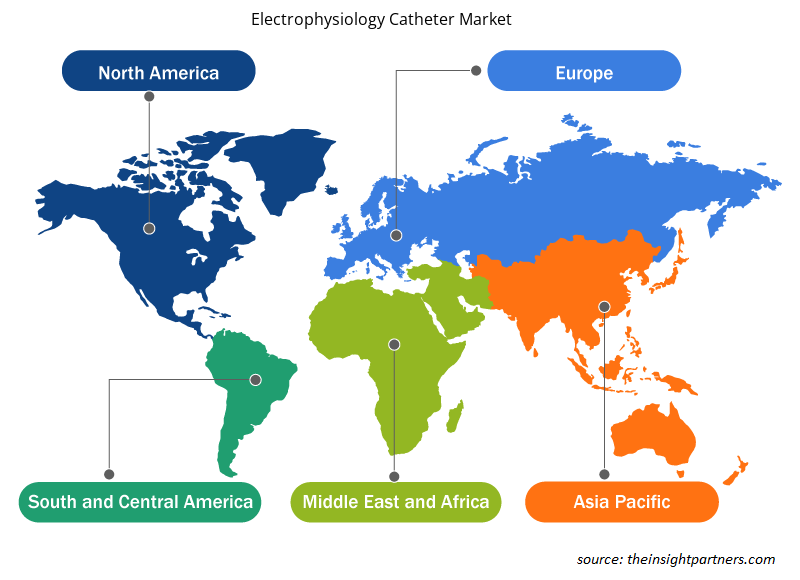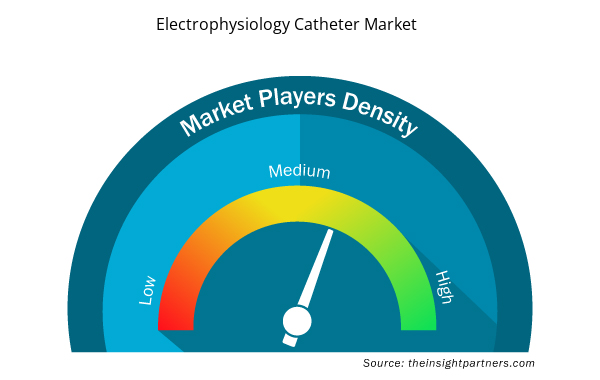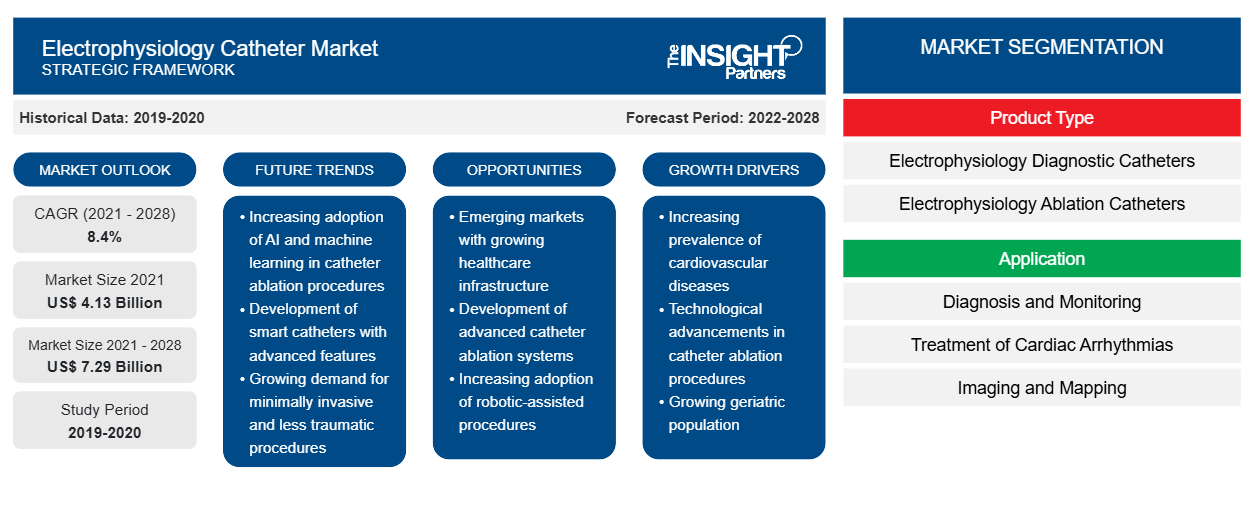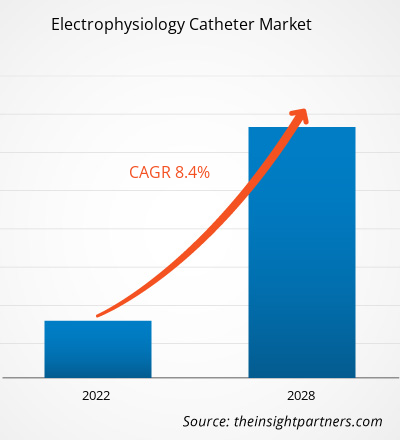Se espera que el mercado de catéteres de electrofisiología alcance los 7.288,50 millones de dólares estadounidenses en 2028, frente a los 4.133,18 millones de dólares estadounidenses en 2021. Se estima que el mercado crecerá a una CAGR del 8,4 % entre 2021 y 2028.
El alcance del mercado de catéteres de electrofisiología incluye el tipo de producto, la aplicación, el usuario final y la geografía. Según la región, el mercado de catéteres de electrofisiología está segmentado en América del Norte, Europa, Asia Pacífico, Oriente Medio y África, y América del Sur y Central. El informe ofrece información y un análisis en profundidad del mercado de catéteres de electrofisiología, haciendo hincapié en varios parámetros como las tendencias y oportunidades del mercado, la dinámica del mercado y el análisis del panorama competitivo de los principales actores del mercado en América del Norte, Europa, Asia Pacífico, Oriente Medio y África, y América del Sur y Central. También incluye un análisis del impacto de COVID-19 en las regiones.
Personalice este informe según sus necesidades
Obtendrá personalización en cualquier informe, sin cargo, incluidas partes de este informe o análisis a nivel de país, paquete de datos de Excel, así como también grandes ofertas y descuentos para empresas emergentes y universidades.
- Obtenga las principales tendencias clave del mercado de este informe.Esta muestra GRATUITA incluirá análisis de datos, desde tendencias del mercado hasta estimaciones y pronósticos.
Perspectivas del mercado
El avance tecnológico impulsa el mercado mundial de catéteres de electrofisiología
La mejora constante en la ciencia médica y los avances tecnológicos continuos dieron como resultado una mayor longevidad y una mejor calidad de vida. Los avances, como la introducción de sistemas EAM tridimensionales (3D), tienen una influencia duradera en la visualización del catéter, el mapeo de arritmias y la reducción y eliminación de la exposición a la fluoroscopia/radiación en la electrofisiología cardíaca . El informe de Frontiers SA afirma que, además de la mejora continua en los sistemas de mapeo existentes, el mercado global está significativamente impulsado por el lanzamiento de varias herramientas nuevas en los últimos años. Por ejemplo, Philips lanzó recientemente un nuevo sistema de navegación e imágenes basado en dieléctricos y no fluoroscópico, llamado KODEX-EPD. El sistema genera imágenes anatómicas cardíacas en 3D de alta resolución sin la necesidad de contacto directo entre el catéter y el tejido o imágenes preadquiridas. Además, tiene un gran potencial al representar una plataforma abierta que permite procedimientos de alta calidad al reducir el costo y la carga para el paciente. El objetivo de diseño de la empresa para los catéteres de electrofisiología es incorporar características que mejoren los resultados para los pacientes y los médicos al reducir los costos para los proveedores de atención médica. Además, en septiembre de 2020, Acutus Medical anunció la recepción de la autorización 510 (k) de la FDA para su catéter de mapeo e imágenes 3D AcQMap de segunda generación. Este nuevo producto es el único catéter integrado de mapeo sin contacto e imágenes por ultrasonido de alta resolución del mundo capaz de capturar información de imágenes cardíacas, lo que ha impulsado el crecimiento del mercado.
Información basada en el tipo de producto
Según el tipo de producto, el mercado de catéteres de electrofisiología se segmenta en catéteres de diagnóstico de electrofisiología y catéteres de ablación de electrofisiología. Los catéteres de diagnóstico de electrofisiología se subsegmentan como catéteres de diagnóstico de electrofisiología convencionales, catéteres de diagnóstico de electrofisiología avanzados y catéteres de diagnóstico de electrofisiología por ultrasonido. Además, los catéteres de ablación de electrofisiología se subsegmentan como catéteres de electrofisiología de crioablación, catéteres de ablación por radiofrecuencia, sistemas de ablación por microondas y sistemas de ablación láser. El segmento de catéteres de diagnóstico de electrofisiología tuvo la mayor participación del mercado en 2021, y se anticipa que el mismo segmento registre la CAGR más alta del 8,8% en el mercado durante el período de pronóstico.
Perspectivas basadas en aplicaciones
Según la aplicación, el mercado de catéteres de electrofisiología se segmenta en diagnóstico y monitorización, tratamiento de arritmias cardíacas e imágenes y mapeo. El segmento de diagnóstico y monitorización tuvo la mayor participación del mercado en 2021, y se prevé que el mismo segmento registre la CAGR más alta del mercado del 9,0 % durante el período de pronóstico.
Información basada en el usuario final
Según el usuario final, el mercado de catéteres de electrofisiología está segmentado en hospitales, centros quirúrgicos ambulatorios y laboratorios de cateterismo cardíaco. El segmento de hospitales tuvo la mayor participación del mercado en 2021, y se prevé que el mismo segmento registre la CAGR más alta del mercado del 8,7 % durante el período de pronóstico.
Las empresas suelen adoptar estrategias inorgánicas, como fusiones y adquisiciones, para satisfacer la cambiante demanda de los clientes y mantener su marca en todo el mundo. Los actores del mercado que operan en el mercado de catéteres de electrofisiología también adoptan estrategias orgánicas, como el lanzamiento y la expansión de productos, para ampliar su presencia y su cartera de productos en todo el mundo y satisfacer la creciente demanda.
Perspectivas regionales del mercado de catéteres de electrofisiología
Los analistas de Insight Partners explicaron en detalle las tendencias y los factores regionales que influyen en el mercado de catéteres de electrofisiología durante el período de pronóstico. Esta sección también analiza los segmentos y la geografía del mercado de catéteres de electrofisiología en América del Norte, Europa, Asia Pacífico, Oriente Medio y África, y América del Sur y Central.

- Obtenga datos regionales específicos para el mercado de catéteres de electrofisiología
Alcance del informe de mercado de catéteres de electrofisiología
| Atributo del informe | Detalles |
|---|---|
| Tamaño del mercado en 2021 | US$ 4,13 mil millones |
| Tamaño del mercado en 2028 | 7.290 millones de dólares estadounidenses |
| CAGR global (2021-2028) | 8,4% |
| Datos históricos | 2019-2020 |
| Período de pronóstico | 2022-2028 |
| Segmentos cubiertos | Por tipo de producto
|
| Regiones y países cubiertos | América del norte
|
| Líderes del mercado y perfiles de empresas clave |
|
Densidad de actores del mercado: comprensión de su impacto en la dinámica empresarial
El mercado de catéteres de electrofisiología está creciendo rápidamente, impulsado por la creciente demanda de los usuarios finales debido a factores como la evolución de las preferencias de los consumidores, los avances tecnológicos y una mayor conciencia de los beneficios del producto. A medida que aumenta la demanda, las empresas amplían sus ofertas, innovan para satisfacer las necesidades de los consumidores y aprovechan las tendencias emergentes, lo que impulsa aún más el crecimiento del mercado.
La densidad de actores del mercado se refiere a la distribución de las empresas o firmas que operan dentro de un mercado o industria en particular. Indica cuántos competidores (actores del mercado) están presentes en un espacio de mercado determinado en relación con su tamaño o valor total de mercado.
Las principales empresas que operan en el mercado de catéteres de electrofisiología son:
- Centro médico St. Jude (Abbott)
- Corporación Científica de Boston
- Corporación Stryker
- Medtronic
- Sistemas Transónicos Inc.
Descargo de responsabilidad : Las empresas enumeradas anteriormente no están clasificadas en ningún orden particular.

- Obtenga una descripción general de los principales actores clave del mercado de catéteres de electrofisiología
Por tipo de producto
- Catéteres de diagnóstico para electrofisiología
- Catéteres de diagnóstico para electrofisiología convencional
- Catéteres de diagnóstico para electrofisiología avanzada
- Catéteres de diagnóstico para electrofisiología por ultrasonidos
- Catéteres de ablación para electrofisiología
- Catéteres de electrofisiología para crioablación
- Catéteres de ablación por radiofrecuencia
- Sistemas de ablación por microondas
- Sistemas de ablación láser
Por aplicación
- Diagnóstico y seguimiento
- Tratamiento de las arritmias cardíacas
- Imágenes y cartografía
Por el usuario final
- Hospitales
- Centros de cirugía ambulatoria
- Laboratorios de cateterismo cardíaco
Por geografía
- América del norte
- A NOSOTROS
- Canadá
- México
- Europa
- Reino Unido
- Alemania
- Francia
- Italia
- España
- Resto de Europa
- Asia Pacífico
- Porcelana
- Japón
- India
- Australia
- Corea del Sur
- Resto de Asia Pacífico
- Oriente Medio y África
- Arabia Saudita
- Sudáfrica
- Emiratos Árabes Unidos
- Resto de Oriente Medio y África
- América del Sur y Central
- Brasil
- Argentina
- Resto de América del Sur y Central
Perfiles de empresas
- Centro médico St. Jude (Abbott)
- Corporación Científica de Boston
- Corporación Stryker
- Medtronic
- Sistemas Transónicos Inc.
- CathRx Ltd
- APT MEDICAL INC.
- Corporación científica MicroPort
- Biosense Webster (Johnson y Johnson Services, Inc.)
- Biotronik, Inc.
- Análisis histórico (2 años), año base, pronóstico (7 años) con CAGR
- Análisis PEST y FODA
- Tamaño del mercado Valor/volumen: global, regional, nacional
- Industria y panorama competitivo
- Conjunto de datos de Excel



Report Coverage
Revenue forecast, Company Analysis, Industry landscape, Growth factors, and Trends

Segment Covered
This text is related
to segments covered.

Regional Scope
North America, Europe, Asia Pacific, Middle East & Africa, South & Central America

Country Scope
This text is related
to country scope.
Preguntas frecuentes
With COVID-19 continuing to spread all over the world, researchers are looking into numerous options for possible treatment, including existing options. The pandemic of COVID-19 has had a significant impact on clinical medicine. Because so many resources have been poured into caring for those afflicted with the virus, elective medical treatments have reduced. The rates of atrial fibrillation ablation and implanted cardioverter-defibrillators (ICD) implantation fell faster than the rates of ventricular tachycardia (VT) ablation and device generator changes, indicating a shift away from elective medical operations. Telemedicine and digital health platforms proved effective during the pandemic as it was largely limited pre-pandemic due to technical and reimbursement barriers. But in the current COVID-19 crisis, the adoption of virtual medical services has grown tremendously and is projected to grow steadily in the coming years. For example, The Centers for Medicare and Medicaid Services have expanded telehealth services to keep people safe and assist healthcare providers to focus on individuals requiring the most dire healthcare needs.
Global electrophysiology catheters market is segmented by region into North America, Europe, Asia Pacific, Middle East & Africa and South & Central America. In North America, the U.S. is the largest market for electrophysiology catheters. The growth of this market is primarily driven by the increasing prevalence of cardiovascular disorders and growing number of product launches by key players. The presence of well-established healthcare facilities coupled with infrastructure and high prevalence of arrhythmia and heart failure cases accounts for significant revenue till the forecast period. Heart disease is the leading cause of death in the US, resulting in recording approx. 647,000 deaths per year as per the Centers for Disease Control and Prevention (CDC).
Johnson and Johnson Services, Inc. and Abbott are the top two companies that hold huge market shares in the electrophysiology catheters market.
The electrophysiology catheters market majorly consists of the players such St. Jude Medical (Abbott), Boston Scientific Corporation, Stryker Corporation, Medtronic, Transonic Systems Inc., CathRx Ltd, APT MEDICAL INC., MicroPort Scientific Corporation, Biosense Webster (Johnson and Johnson Services, Inc.), and Biotronik, Inc. among others.
The electrophysiology diagnostic catheters segment held the largest share of the market in the global electrophysiology catheters market and held the largest market share of 60.36% in 2021.
The diagnosis segment dominated the global electrophysiology catheters market and accounted for the largest market share of 50.24% in 2021.
The hospitals segment dominated the global electrophysiology catheters market and held the largest market share of 60.55% in 2021.
Electrophysiology catheters are designed to be used for better compatibility to perform standard electrophysiology studies. The catheter comprises of compatible stimulators/amplifiers that are purchased separately by the operator. Depending on the features of the simulator/amplifier, pacing, and recording protocols can be performed inside the human's body to determine abnormalities. For example, electrophysiology catheters are performed inside the heart (intracardiac) or through the esophagus (transesophageal) for determining electrical properties of the atrium and ventricle. Diagnostic electrophysiology (EP) catheters are used for temporary intra-cardiac sensing, recording, stimulation, and mapping.
Key factors that are driving the growth of this market are prevalence of cardiovascular disorders and technological advancement in electrophysiology catheters are expected to boost the market growth for the electrophysiology catheters over the years.
The CAGR value of the electrophysiology catheters market during the forecasted period of 2021-2028 is 8.4%.
Trends and growth analysis reports related to Life Sciences : READ MORE..
The List of Companies - Electrophysiology Catheters Market
- St. Jude Medical (Abbott)
- Boston Scientific Corporation
- Stryker Corporation
- Medtronic
- Transonic Systems Inc.
- CathRx Ltd
- APT MEDICAL INC.
- MicroPort Scientific Corporation
- Biosense Webster (Johnson and Johnson Services, Inc.)
- Biotronik, Inc.
The Insight Partners performs research in 4 major stages: Data Collection & Secondary Research, Primary Research, Data Analysis and Data Triangulation & Final Review.
- Data Collection and Secondary Research:
As a market research and consulting firm operating from a decade, we have published and advised several client across the globe. First step for any study will start with an assessment of currently available data and insights from existing reports. Further, historical and current market information is collected from Investor Presentations, Annual Reports, SEC Filings, etc., and other information related to company’s performance and market positioning are gathered from Paid Databases (Factiva, Hoovers, and Reuters) and various other publications available in public domain.
Several associations trade associates, technical forums, institutes, societies and organization are accessed to gain technical as well as market related insights through their publications such as research papers, blogs and press releases related to the studies are referred to get cues about the market. Further, white papers, journals, magazines, and other news articles published in last 3 years are scrutinized and analyzed to understand the current market trends.
- Primary Research:
The primarily interview analysis comprise of data obtained from industry participants interview and answers to survey questions gathered by in-house primary team.
For primary research, interviews are conducted with industry experts/CEOs/Marketing Managers/VPs/Subject Matter Experts from both demand and supply side to get a 360-degree view of the market. The primary team conducts several interviews based on the complexity of the markets to understand the various market trends and dynamics which makes research more credible and precise.
A typical research interview fulfils the following functions:
- Provides first-hand information on the market size, market trends, growth trends, competitive landscape, and outlook
- Validates and strengthens in-house secondary research findings
- Develops the analysis team’s expertise and market understanding
Primary research involves email interactions and telephone interviews for each market, category, segment, and sub-segment across geographies. The participants who typically take part in such a process include, but are not limited to:
- Industry participants: VPs, business development managers, market intelligence managers and national sales managers
- Outside experts: Valuation experts, research analysts and key opinion leaders specializing in the electronics and semiconductor industry.
Below is the breakup of our primary respondents by company, designation, and region:

Once we receive the confirmation from primary research sources or primary respondents, we finalize the base year market estimation and forecast the data as per the macroeconomic and microeconomic factors assessed during data collection.
- Data Analysis:
Once data is validated through both secondary as well as primary respondents, we finalize the market estimations by hypothesis formulation and factor analysis at regional and country level.
- Macro-Economic Factor Analysis:
We analyse macroeconomic indicators such the gross domestic product (GDP), increase in the demand for goods and services across industries, technological advancement, regional economic growth, governmental policies, the influence of COVID-19, PEST analysis, and other aspects. This analysis aids in setting benchmarks for various nations/regions and approximating market splits. Additionally, the general trend of the aforementioned components aid in determining the market's development possibilities.
- Country Level Data:
Various factors that are especially aligned to the country are taken into account to determine the market size for a certain area and country, including the presence of vendors, such as headquarters and offices, the country's GDP, demand patterns, and industry growth. To comprehend the market dynamics for the nation, a number of growth variables, inhibitors, application areas, and current market trends are researched. The aforementioned elements aid in determining the country's overall market's growth potential.
- Company Profile:
The “Table of Contents” is formulated by listing and analyzing more than 25 - 30 companies operating in the market ecosystem across geographies. However, we profile only 10 companies as a standard practice in our syndicate reports. These 10 companies comprise leading, emerging, and regional players. Nonetheless, our analysis is not restricted to the 10 listed companies, we also analyze other companies present in the market to develop a holistic view and understand the prevailing trends. The “Company Profiles” section in the report covers key facts, business description, products & services, financial information, SWOT analysis, and key developments. The financial information presented is extracted from the annual reports and official documents of the publicly listed companies. Upon collecting the information for the sections of respective companies, we verify them via various primary sources and then compile the data in respective company profiles. The company level information helps us in deriving the base number as well as in forecasting the market size.
- Developing Base Number:
Aggregation of sales statistics (2020-2022) and macro-economic factor, and other secondary and primary research insights are utilized to arrive at base number and related market shares for 2022. The data gaps are identified in this step and relevant market data is analyzed, collected from paid primary interviews or databases. On finalizing the base year market size, forecasts are developed on the basis of macro-economic, industry and market growth factors and company level analysis.
- Data Triangulation and Final Review:
The market findings and base year market size calculations are validated from supply as well as demand side. Demand side validations are based on macro-economic factor analysis and benchmarks for respective regions and countries. In case of supply side validations, revenues of major companies are estimated (in case not available) based on industry benchmark, approximate number of employees, product portfolio, and primary interviews revenues are gathered. Further revenue from target product/service segment is assessed to avoid overshooting of market statistics. In case of heavy deviations between supply and demand side values, all thes steps are repeated to achieve synchronization.
We follow an iterative model, wherein we share our research findings with Subject Matter Experts (SME’s) and Key Opinion Leaders (KOLs) until consensus view of the market is not formulated – this model negates any drastic deviation in the opinions of experts. Only validated and universally acceptable research findings are quoted in our reports.
We have important check points that we use to validate our research findings – which we call – data triangulation, where we validate the information, we generate from secondary sources with primary interviews and then we re-validate with our internal data bases and Subject matter experts. This comprehensive model enables us to deliver high quality, reliable data in shortest possible time.


 Obtenga una muestra gratuita de este informe
Obtenga una muestra gratuita de este informe